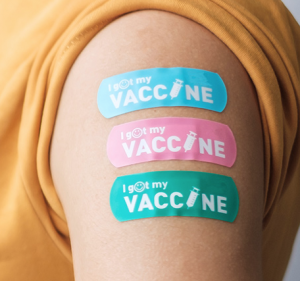Vaccine-induced immunity – What does the future hold if vaccines fail?

Hi All, FYI, please see below my email to Emeritus Professor Raanan Gillon, President of the British Medical Association, raising important questions about international vaccination policy and practice, and the medical profession’s failures in this area. The email below can also be accessed via this link, please circulate to others for information: https://overvaccinationepidemic.files.wordpress.com/2020/03/vaccine-induced-immunity-what-does-the-future-hold-if-vaccines-fail.pdf
My email to Professor Gillon focuses on Heidi Larson’s recent startling admission, i.e. “…We’ve shifted the human population…to dependency on vaccine-induced immunity…We’re in a very fragile state now. We have developed a world that is dependent on vaccinations”.
Please see attached a transcript I’ve prepared of Heidi Larson’s plenary lecture at the WHO Global Vaccine Safety Summit convened in December 2019, it’s an interesting read on a number of levels…
I intend to pursue further correspondence with Professor Gillon on more vaccination matters.
I have to try and raise these matters overseas, as the situation in Australia is absolutely dire, vaccination policy is a corrupted and conflicted mess here, with no accountability.
Elizabeth
For the attention of:
Emeritus Professor Raanan Gillon
President of the British Medical Association
Dear Professor Gillon
Heidi Larson, Director of The Vaccine Confidence Project, made startling admissions during the recent WHO Global Vaccine Safety Summit[1], i.e.
“…We’ve shifted the human population…to dependency on vaccine-induced immunity…We’re in a very fragile state now. We have developed a world that is dependent on vaccinations”.[2]
Professor Gillon, what do you think about the human population being made dependent on vaccine-induced immunity? Has a Pandora’s Box been opened – is the community being made increasingly dependent upon the vaccine industry? Is natural immunity being destroyed by an ever-increasing number of vaccine products? And what does the future hold for future generations if vaccines fail? For example, measles and mumps vaccines, pertussis and pneumococcal vaccines, flu vaccines and others?
These are important questions. But the medical profession has largely failed to question international vaccination policy and practice, and the plethora of vaccine products and revaccinations now being pushed upon the global community.
The medical profession must now lead on demanding urgent objective and independent investigation of emerging vaccine failures, and consideration of what this means for natural immunity and the future of the human species.
There must be an immediate moratorium on the addition of any more vaccine products to international vaccination schedules, pending a transparent review of existing vaccine products and revaccinations.
There must also be an urgent investigation into the morass of conflicts of interest engulfing international vaccination policy.
Doctors are in the front line of coaxing the global community to accept an ever-increasing number of lucrative vaccine products and revaccinations. But how much do doctors know about these medical interventions, including emerging problems?In her plenary lecture at the WHO Summit, Heidi Larson suggests doctors and nurses have little knowledge in this area, saying “I mean in medical school you’re lucky if you have a half day on vaccines, never mind keeping up to date with all this”.[3]
Heidi Larson suggests some doctors are beginning to question vaccination, that they might be losing confidence in vaccines, i.e.:
“We have a very wobbly health professional front-line, that is starting to question vaccines and the safety of vaccines. That’s a huge problem. Because to this day, any study I’ve seen, and we’re constantly looking on any studies in this space, still the most trusted person on any study I’ve seen globally is the healthcare provider. And if we lose that, we’re in trouble. And we haven’t lost it yet, but we’ve talked about it earlier, some of the challenges are when the front-line professionals are starting to question, or they don’t feel like they have enough confidence about the safety to stand up to it, to the person asking them the questions.”[4]
There’s a lot at stake here for the credibility of the medical profession Professor Gillon. It appears healthcare providers have little knowledge about the numerous vaccine products and revaccinations they press upon their patients. But as Heidi Larson says, healthcare providers are the ‘most trusted people’ – do doctors and nurses deserve this trust in their promotion of vaccine products?
Alarmingly, it seems health practitioners are discouraged from questioning vaccination practice, and are expected to adhere to ever-increasing vaccination schedules without demur. For example, in Australia, the CEO of the health regulator AHPRA, Martin Fletcher, has “reminded practitioners that supporting public health programs, including vaccination and immunisation, and not promoting anti-vaccination views were regulatory responsibilities”.[5]
But what exactly are ‘anti-vaccination views’? Nowadays it seems any citizen asking legitimate questions about vaccination policy and practice is instantly tagged as ‘anti-vaccination’, and discredited and marginalised. How can health practitioners raise concerns about various vaccine products in this hostile climate, when to do so means risking de-registration and the loss of their careers and livelihoods?
AHPRA CEO Martin Fletcher says “Registered health practitioners have a regulatory responsibility to support patients to understand the evidence-based information available”.[6]
Are health practitioners aware that much of this ‘evidence-based information’ has been generated by the vaccine industry and its conflicted supporters, with little or no objective and independent evaluation? Are health practitioners being deliberately hindered in questioning the so-called ‘evidence-based information‘ that props up global vaccine markets?
For years we’ve been told “Vaccination has greatly reduced the burden of infectious diseases”.[7] This is a motherhood statement that often prefaces so many articles on vaccination, and goes hand in hand with ‘the science is settled’[8], another cliche that fails to acknowledge emerging problems with the ever-increasing vaccine load.
The idea of a magic bullet to prevent disease and the burden on public health systems is very compelling. But there are signs the magic bullet is failing. And it seems those controlling vaccination policy and practice are beset by cognitive dissonance, which prevents them from acknowledging and acting upon what is looming as a global emergency, i.e. multiple vaccine failures.
Global vaccination policy and practice is dominated by a bloated and conflicted vaccination bureaucracy which has been hijacked by the pharmaceutical industry and the over-powering influence of the Bill and Melinda Gates Foundation.[9] This vaccination bureaucracy is wedded to vaccination ideology and evermore vaccines, and apparently unable to comprehend the repercussions of failing vaccines for natural immunity and what this means for the future of humankind.
Now we are seeing global alarm being driven about SARS-CoV-2/COVID-19, with confusing reports about the danger level and risk of infection – are most people seriously at risk of COVID-19 disease? What cofactors are at play? Of course there is the inevitable ‘race for a vaccine’ for this latest health scare. In Australia the situation becomes even more sinister when we realise that forced vaccination of citizens is a possibility under the Biosecurity Act 2015.[10]
Is it possible that vaccination against each and every ailment could do more harm than good? We’re currently witnessing the damaging effects of the over-use of other medical products such as opioids, antibiotics, anti-depressants etc, which doctors have over-prescribed for years.
I suggest over-vaccination has the potential to eclipse the damage being done by the over-use of other medical products, given this medical intervention for an ever-increasing number of ailments is being pushed upon mass populations. We have no idea of the long-term cumulative effects of repeated vaccination throughout life, and the damage to natural immunity, this is ‘undone science’.
Lucrative vaccine products have become a major growth area for the pharmaceutical industry. In 2002 the global vaccine market was US$5.7 billion.[11] In 2018 the global vaccines market size was US$41.61 billion and is projected to reach US$93.08 billion by 2026[12], a more than 16 fold increase in the last 20 odd years.
We have little or no objective and independent analysis of the burgeoning vaccine market, or of the safety and effectiveness of these products – even Cochrane is proving to be worse than useless in this area. Vaccine products are generally being backed by conflicted industry data in the ‘peer-reviewed literature’, and rubber-stamped by government regulators and vaccine committees. It can be argued that these are experimental products being pressed upon mass populations, including government-mandated vaccination in a growing number of countries, with little or no accountability.
Citizens seeking transparency and accountability for coercive vaccination policy and practice have few places to turn, with politicians and academics and medical associations influencing vaccination policy often refusing to respond to citizens’ concerns on this matter. Is it any wonder that discerning citizens are becoming ‘vaccine hesitant’?[13]
BMJ rapid responses provide one of the very few avenues for citizens to publicly document serious concerns about vaccination policy and practice, but even if they make it to on-line publication, this is where they remain buried – has a citizen’s BMJ rapid response questioning vaccination policy or a vaccine product ever made it to The BMJ print edition?
For instance, on BMJ rapid responses I have repeatedly tried to raise discussion about the alarming problem of early waning of measles passive immunity in babies of vaccinated mothers, see for example: Measles vaccination – is anyone worried about shorter term maternally derived antibodies via vaccinated mothers? (29 October 2018)
As far as I’m aware, The BMJ has not investigated this emerging problem. When there are problems with vaccine products they must be addressed, otherwise who knows what damage might result in future?
Doctors have a duty to their patients/clients, and should be encouraged to be alert and questioning in regards to the remarkable growth of lucrative vaccine products and revaccinations in recent years – this is the most important health issue facing the world today.
Professor Gillon, with your experience in medical ethics, I request your consideration of the serious matters raised here, and your response to me and others copied on this email, who I suggest are also accountable for their influence on vaccination policy and practice.
Using Heidi Larson’s WHO plenary lecture transcript as a springboard, I will bring other vaccination issues to your attention in due course, including more re measles, mumps, flu, HPV, meningococcal B, pertussis, aluminium adjuvants, and conflicts of interest in vaccination policy. Please see attached my transcription of Heidi Larson’s lecture. Her slides for this presentation are currently accessible on the WHO website: https://www.who.int/vaccine_safety/bios-global-vaccine-safety-summit-hearing-meeting-day-2/en/
Please note this correspondence will also be circulated to other parties for information, these are important matters of public interest.
Yours sincerely
Elizabeth Hart
Independent citizen investigating conflicts of interest in vaccination policy and the over-use of vaccine products
cc:
Mr Jay Lippincott, Chair, BMJ, Non-Executive Director, BMA
Dr Chaand Nagpaul, Council Chair, BMA
Dr Fiona Godlee, Editor in Chief, The BMJ
Professor Heidi Larson, The Vaccine Confidence Project
Dr Patrick Zuber, Group Leader WHO Vaccine Safety Team
Attachment:
Transcript of Professor Heidi Larson’s Plenary Lecture at the WHO Global Vaccine Safety Summit 2-3 December 2019 –
Vaccine safety in the next decade: Why we need new modes of trust building?
References:
1. Global Vaccine Safety Summit, held by the World Health Organization, 2-3 December 2019: https://www.who.int/news-room/events/detail/2019/12/02/default-calendar/global-vaccine-safety-summit
2. Global Vaccine Safety Summit Plenary Lecture: Professor Heidi Larson – Vaccine safety in the next decade: Why we need new modes of trust building? See copy attached.
3. Ibid.
4. Ibid.
5. Practioners’ responsibility to support public health programs. AHPRA & National Boards. 8 May 2019: https://www.ahpra.gov.au/News/2019-05-08-practitioners-responsibility-to-support-public-health-programs.aspx
6. Ibid.
7. FE Andre, R Booy et al. Vaccination greatly reduces disease, disability, death and inequity worldwide. Bulletin of the World Health Organization. Volume 86, Number 2, February 2008, 140-146.
8. For example, as used by UK Health Secretary Matt Hancock, i.e.: “…Those people who campaign against vaccination are campaigning against science. The science is settled”. It seems that anyone questioning vaccination is regarded as ‘campaigning against vaccination, campaigning against science’. The ‘science is settled’ is a facile statement that ignores the possibility of emerging problems with vaccine products. Matt Hancock was quoted in The Guardian article: Matt Hancock ‘won’t rule out’ compulsory vaccinations, 4 May 2019: https://www.theguardian.com/politics/2019/may/04/matt-hancock-wont-rule-out-compulsory-vaccinations
9. See for example Philanthropic Power and Development – Who shapes the agenda? Chapter 2: Philanthropic influence and the global health agenda. https://www.globalpolicy.org/images/pdfs/GPFEurope/Philanthropic_Power_online.pdf (Jens Martens and Karolin Seitz)
10. Australian Government Biosecurity Act 2015: https://www.legislation.gov.au/Series/C2015A00061
11. 20 Top-selling Vaccines – H1 2012. FiercePharma, 25 September 2012.
12. Vaccines Market Size, Share & Industry Analysis, By Type (Recombinant/Conjugate/Subunit, Inactivated, Live Attenuated), by Route of Administration (Parenteral & Oral), By Disease Indication (Viral Diseases (Hepatitis, Influenza, Human Papilloomavirus) and Bacterial Diseases (Meningococcal, Pneumococcal)), By Age Group (Pediatric & Adults), By Distribution Channel (Hospital & Retal Pharmacies, Government Suppliers) & Region Forecast, 2019-2026. Fortune Business Insights. February 2020: https://www.fortunebusinessinsights.com/industry-reports/vaccines-market-101769
13. Fiona Godlee. What should we do about vaccine hesitancy? BMJ2019;365:l4044.









